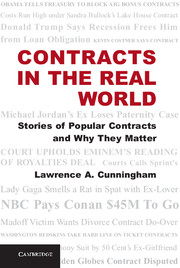5 - Rewinding
Restitution and Unjust Enrichment
Published online by Cambridge University Press: 05 June 2012
Summary
All sensible people are selfish, and nature is tugging at every contract to make the terms of it fair.
– Ralph Waldo EmersonGRATUITY OR EXCHANGE: CARING FOR AUNT FRANCES
Good Samaritans earn their name because they act out of kindness, not seeking pay. But a blurry line divides altruism from profit seeking, nowhere hazier than when people care for distant elderly relatives. Jane Gorden learned this lesson after moving from Houston to Nashville to tend to her octogenarian aunt, Frances Cleveland, at the behest of her aunt’s neighbor. Gorden looked after her aunt for five years, placed her in a nursing facility, rented out her home, and paid her bills. In total, she advanced $100,000 to her aunt. Aunt Frances knew of her niece’s generosity and once told a companion that Gorden “would get everything she had, if there was anything left.” But when Aunt Frances died, she had made no provision in her decades-old will for Gorden, leaving everything – a beautiful home, a classic 1932 Ford – to her hometown church. Her estate denied Gorden’s request for reimbursement, asserting the advances were gifts and that the two had made no contract.
Ordinarily, contract law enforces bargains when they are made before performance is rendered. If Aunt Frances had agreed to repay Jane’s advances ahead of receiving them, the arrangement would follow the standard pattern and be enforceable. But contract law does not recognize the opposite sequence, performance before bargain, or, in Jane’s case, Jane lending Aunt Frances money followed by the aunt’s promise to repay. People conferring benefits without bargains are usually seen to act gratuitously. There is a rationale behind this doctrine: Any other rule would mean that people could impose contract duties on others simply by conferring benefits on them. In such a world, one would expect mail-order companies shipping unordered goods for payment, squeegee windshield washers making enforceable claims for money, and neighbors doing more to each other’s homes than anyone would want.
Information
- Type
- Chapter
- Information
- Contracts in the Real WorldStories of Popular Contracts and Why They Matter, pp. 109 - 125Publisher: Cambridge University PressPrint publication year: 2012
